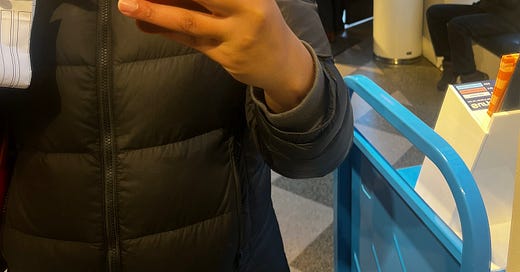When I turned 30, I knew it was time to start being more responsible. If my twenties were for figuring out what didn’t work in my career, social, and emotional lives then my thirties would be about tending to the things that do help me thrive. In preparation, I’ve been getting around to all the doctor’s appointments I put off for years. Dentist for wisdom tooth extraction, check. Find a black gynecologist (a unicorn), check. Go to the optometrist, check. I thought 30 was the perfect time to finally get the glasses I’ve known I needed since 16.
How, might you ask, did I escape this reality for almost 15 years? Well, my needs were so minimal and mild that I could do without them. I only need them for far distances. And I only notice that need when the far-away objects are small and intricate. So, I can see a movie screen just fine. All throughout my schooling I could see boards alright, although I did tend to sit in the front third of the classroom. I also managed to write about art from 2019 through 2024 without glasses. I’ve functioned thus far without glasses and haven’t noticed anything missing.
The only reason I got glasses was the same reason it took so long for me to get them; I only need them driving at night. I started driving later than most young adults, at 21. And I don’t drive a lot or much at night. I don’t enjoy driving all that much. At the DMV, the lady conducting my initial vision test either couldn’t see me squinting or didn’t care. I even convinced my mom that I didn’t need glasses because I’ve not shown any of the tells of someone who needs help seeing. My students also didn’t realize I couldn’t see the board clearly as I taught for 3 semesters.
Now that I have two pairs of glasses, I still prefer to leave them at home. With art exhibitions, in particular, myopia forces me to move around a piece. Walking up close, moving to the left and right, my brain notices different things with each step. What seems like paint at first glance becomes painted textiles. For this reason, I visit exhibitions when there is time and space to move freely around the gallery. At performances noticing an actor come in and out of focus sometimes is preferred. I tried wearing my glasses recently for the entirety of a performance and the strain of seeing too much all the time hurt my brain; too many stimuli came in all different directions. A little blur protects my energy like the light jacket you bring just in case the temperature drops 20 degrees in an hour.
The other day, my sister complained about having to wear contacts. Seeing everything in HD is exhausting. I started to agree with her. She stopped me, reminding me that I had forwent wearing glasses that I needed for years. That’s different from taking off your glasses every so often to let your eyes rest. And I’d like to belatedly argue that choosing to not see things clearly could be an act of self-preservation or foolishness depending on how you look at it.
This whole post is either really silly or really dumb of me and only works because, for the most part, I can see just fine and not perfectly. I’d like to argue that I don’t need to see perfectly I just need to see enough to understand and I can do that without glasses.





As someone who has worn glasses since third grade, and can’t walk more than 20 feet without glasses or contacts, this was fun to read!
Just wait till you turn 40!!!!